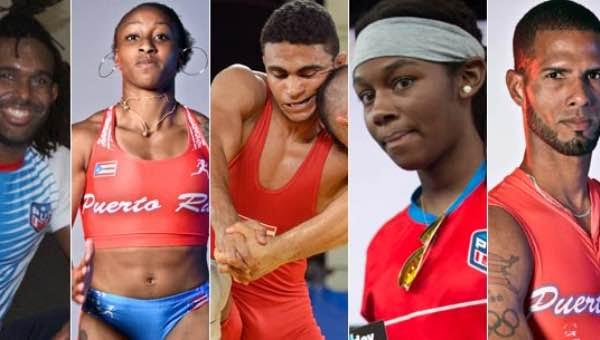

For Puerto Ricans, national sports are heroic, liberating and political root canals thrusting against the canine teeth of United States imperialism. Sports are supposed to bring the good side of nationalism while echoing a rallying cry indebted to the Puerto Rican nation. In a way, sports serve the sole purpose of battling the U.S. without ever considering the hypervisbility of Black bodies. When observing Puerto Rican athletes, the first thing that is noticeable is the high number of Black Puerto Rican athletes. This is nothing new for countries that have a history of slavery, racial hierarchies and systemic discrimination. In these countries, Black people were seen (and still are) as being suited for hard labor and more recently, capable of performing well in sports as it became an opportunity for Black athletes to thrive.
However, there is nothing in this world that dismays Puerto Ricans more than speaking about race and racism, especially at a time when there is a massive population decrease towards the United States accompanied by the economic crisis as a result of vulture hedge funds. You’re probably wondering why does discussing race and institutional racism make Puerto Ricans shiver and hide under the bed or shut down completely? The reason is that Puerto Rican identity rests on the foundational myth that we are all mixed racially from European, African and indigenous ancestry.
In order to support that myth, there had to be racial hierarchies and social Darwinian actions to whiten the population by bringing in more Europeans and encouraging Blacks not to procreate with other Blacks—essentially to “improve the race.” Another tactic used was to engrain in Black people the idea that no such hierarchies existed and encourage them to compare Puerto Rico as more racially democratic in comparison to the United States.
As a result, when Puerto Ricans are discussing race and racism with other Puerto Ricans who defy racism, they enter the world of psychosis where they are unable to distinguish personal subjective experience (and patriotism) from the reality of the external world such as institutional racism.
Unlike other countries like in the Americas, the Puerto Rican Black population is much smaller and less politically active in fighting for social and racial justice. Indeed, in her book Scripts of Blackness: Race, Cultural Nationalism, and U.S Colonialism (2015) Isar P. Godreau argues that Puerto Rican national discourses about race (created to overcome U.S. colonial power) simultaneously privilege whiteness, typecast blackness and silence charges of racism.
So far this year, we have seen Puerto Ricans get in trouble for saying racist comments such as Bebe Maldonado’s position of “eliminating Muslims from the map” to Miss Puerto Rico’s Islamophobic comments, which were met in defiance by the activist Michael Moore who denounced her publicly. Usually, Puerto Ricans engage in racism in the households or among themselves, but with social media there have been several cases of Puerto Ricans caught on camera committing racist acts, such as the case of Juan Taylor, who was on a plane headed to Puerto Rico until a Puerto Rican women refused to sit next to him because he was Black.
The Olympics and Black Puerto Rican Athletes
Furthermore, in regards to this year’s Olympics in Rio de Janeiro, many writers have emphasized the impact that Black athletes have on Black communities while others have reported racist comments, as is the case with Marcos Slay, a Brazilian administrator from Rio Branco (capital city of the state of Acre), who said the following about Afro-Brazilian goalkeeper Bárbara do Monte Barbosa, “I hate Blacks but Brazil’s goalie has a chance!” Slay later justified his comment by saying, “I have a Black wife and several black friends.” For some reason, people (including Puerto Ricans) continue to believe that these repetitive acts of racism aren’t played out in 2016. For some, it is acceptable to revere Black Puerto Rican athletes as long as they’re contributing to the nationhood, which was built on the backs of Black bodies.
As a colony going through an economic crisis, Puerto Rico wants to showcase medals for independence from the United States without acknowledging the Black labor that has existed in Puerto Rico for the last four hundred years. When it comes to the physicality of Black bodies in areas such as labor, arts and athleticism, it’s always acceptable, expected and unextraordinary, as long as Black people are doing it. However, when white bodies are doing that same work, it is perceived as extraordinary, magical and hyperpatriotic. But it’s not really magical because Black athletes are working against oppression and still managing to be the best athletes. Black people in Puerto Rican culture don’t fit neatly into the nation (because were all supposed to be mixed), therefore expecting them to speak openly about racism are unexpected.
For some reason, bettering themselves also includes staying silent on the elephant on the room. Puerto Ricans may pretend that there is no difference between Mónica Puig and Javier Culson or Jaime Espinal and Gigi Fernández, but the reality is that these athletes got to the Olympics in different ways. Just this week, El Nuevo Dia announced that the Afro-Puerto Rican hurdler Jasmine Quinn Camacho will compete in this years Olympics representing Puerto Rico. However, they referred to her as only 50% Puerto Rican: “She has never visited the island until last week when she came for a photo shoot at the Olympic house but there’s 50 % of Boricua running through her veins.”
I don’t recall Monica Puig getting called 50 % percent Puerto Rican. (Her father is Cuban American.)
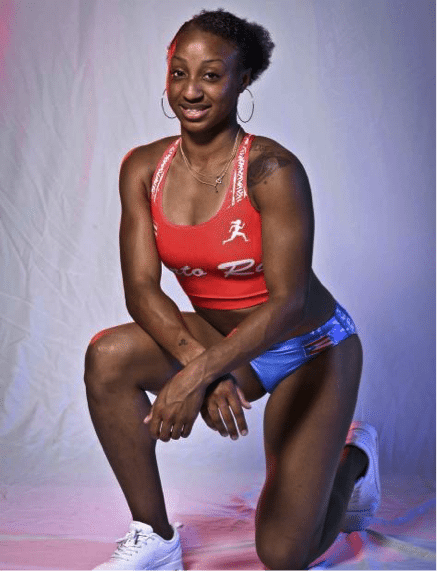

Jasmine Quinn Camacho
Black Puerto Rican athleticism is a reflection of how Blackness is dealt with in the island, seen but unspoken. We’re starting to get comfortable of talking about the diaspora but when are we going to be willing to talk bout Blackness in the diaspora without avoiding the issue? Actually, It’s not the first time Puerto Ricans have questioned the Puertoricanness of Black Puerto Ricans athletes. Other Black Puerto Rican athletes such as Roberto Clemente Walker, Victor Pellot Pove, Carmelo Anthony, Renaldo Balkman (among others) have been questioned in the past.
So we have to ask ourselves: Who are these athletes? Where are they from? What have their experiences been? How are they the same and how are they different? Should we care about them only if they get us a gold Olympic medal? For example, the first Puerto Rican to receive an Olympic medal was a Black man named Juan Evangelista Venegas. Raised in the slums of San Juan where poverty and bare-fist fighting was common, he ended up representing Puerto Rico during the 1948 summer Olympics in London. This event was important for Puerto Ricans because it was the same year the island was able to participate in the Olympics as its own country.
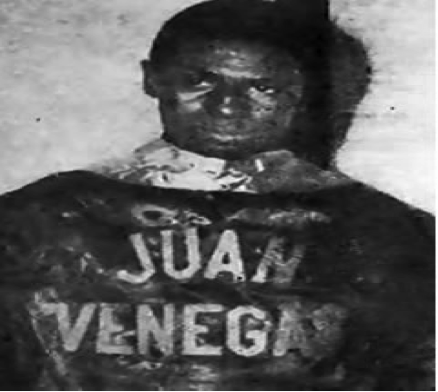

Juan Evangelista Venegas
I wonder if race and Blackness mattered then? I wonder if Black athletes spoke out against racism? For a Black man who was born fifty years after the abolition of slavery, I doubt it was a walk in the park during that time period, even if Puerto Rico were a colony of the United States. I wonder how difficult it must’ve been to grow up in the slums of Puerto Rico and then be able to win an Olympic medal. If they didn’t care then (or “see race”), I doubt they care now.
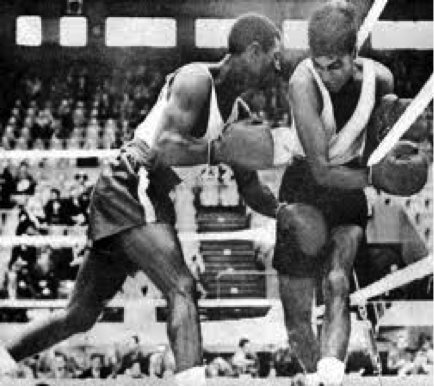

Venegas in the ring
Anti-Blackness and Puerto Rico
Apparently Black people only matter to Puerto Ricans when they make Puerto Rico look good. In Julio Ricardo Varela’s 2012 op-ed discussing governor Luis Fortuño’s hypocrisy for waving the Puerto Rican flag while being for statehood and supporting Puerto Rico in the Olympics, Fortuño had the audacity to take a picture with Javier Culson’s family members, who are Black. Above all, Fortuño never mentioned anything about Black Puerto Ricans in all his term as governor but yet makes himself a double hypocrite by waving the Puerto Rican flag and on top of that with a Black family.
Equally important, was the recent controversy where Gigi Fernández (the first Puerto Rican to win a gold medal while representing the U.S..) challenged Olympic silver medalist Jaime Espinal’s Puertoricanness. She tweeted: “Es Dominicano o de Puerto Rico? Double standard.” Espinal responded: “Con respeto, soy Dominicano. Nadie respondió tu pregunta y represento a Puerto Rico con mi vida. Por más de mil razones”. (With much respect, I am Dominican. Nobody answered your question and I represent Puerto Rico with my life. For more than a thousand reasons.) Content with his response, Fernández ended the exchange, “Te apoyo. Es un orgullo cargar la bandera de PR. Let’s give credit where credit is due. That’s all.” (I support you. It’s a proud moment to hold the Puerto Rican flag.)
After this Twitter exchange, Espinal changed his stance in a short op-ed last week, where he said the following: “When I saw Gigi’s message, I didn’t see anyone looking for trouble, nobody attacking me, nobody wanting to ruin the special moment that was occurring while I was bearing the flag.” Espinal’s refusal to stand up even for himself is problematic because it continues to make Black Puerto Ricans like him complicit in day-to-day racism. The fact that he doesn’t even pick up on the sub-textual micro-aggression that ensued in her questioning is worrisome.
I think that’s the problem: Black Puerto Ricans people don’t recognize racism or don’t call it out.
If Black Puerto Ricans can’t even recognize racism coming from Puerto Ricans, how are they going to survive in a racist country like the United Sates? Are they going to say something like: “Black Lives Matter ain’t got nothing to do with me?” If Black Puerto Ricans aren’t calling out racism, it makes it seem like they love white supremacy or are content with it and ultimately have no issues with it.
Even if you’re not a Black Puerto Rican, you should be worried about decolonizing Puerto Rico from its history of white supremacy. If you care about independence, you should worry about the fact that Black Puerto Ricans can’t even pick up on racism.
Despite Puerto Ricans’ refusal to acknowledge race, the truth of the matter is that there is a difference between the success of Mónica Puig and Jaime Espinal, the same way there is a difference between the success of Gigi Fernández and Javier Culson.
Puig is one of the few white middle class Puerto Ricans able to get private tennis lessons on tennis with private funds. Espinal and Culson could say more about the impact they have on Puerto Rican culture but as is the case with Puerto Ricans, they tend to remain silent on the other opportunities beyond sport that Black people don’t get. I admire them for improving their quality of life, but that doesn’t mean that they have to remain silent on the issues of racism they go through.
The Silence
The question is: why are Black Puerto Rican athletes silent?
The following interview, where Espinal talks about the racism he experienced in the U.S., might offer some answers:
When asked to elaborate, Espinal states the following:
That was the first time I ever confronted racism. Never in my life [in Puerto Rico] have I confronted racism. For me, when they used to call me Dominican, it was another nickname. I didn’t feel like they were marginalizing me. I didn’t feel like Puerto Rico and Dominican Republic were two different things. For me it has been the same thing. We look the same, we dress the same, we listen to the same music. But it was over the there [the United States] where I noticed that people were racist based on the color of the skin. I never saw that in my life. I didn’t know I was Black until I went over there.
What is interesting is that these comments weren’t directed at White Americans but rather at African Americans who Espinal mentions, “wherever you see a lot of morenos together, they approach you, they always had comments and they threw papers at you.” Although I understand that being Black and Puerto Rican in the United States sucks because your blackness is not acknowledged, Espinal still refers to “the morenos” as “these Black people” without ever trying to racially and experientially bond with them. (I would probably throw papers at somebody like that too.)
There is nothing new about the typical colorblind ideology that persists among Puerto Ricans, many who are Black. Comparing a predominantly Black country like Dominican Republic with Puerto Rico by saying “we look the same” attempts to erase Espinal’s own Blackness out of the equation while neglecting the racism that many Black people face in Puerto Rico.
And then there is this: Espinal had the audacity to go to “Raymond y sus amigos” and partake in a show with a brownface character called Hasim while Raymond Arrieta was making fun of Indians and their accent.
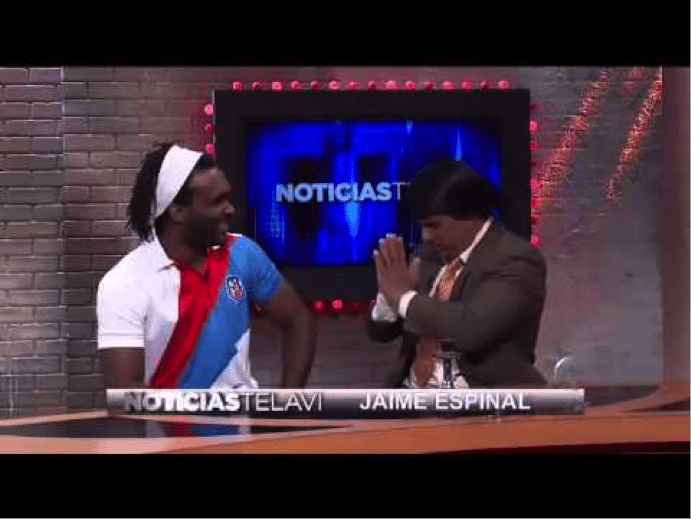

What I find ridiculous is that Espinal states that he has never seen racism in Puerto Rico but then goes on a brownface show dedicated to belittling Indians. Espinal could’ve at least took a stance and refused to partake in such colorblind ideology. Being submissive has never really worked out for Black people around the world, which is why other countries around the Americas are speaking up against racial injustice.
It Goes Beyond Sports
If Puerto Ricans love to cheer on Black Puerto Ricans, then they have to care about Black Puerto Ricans both in Puerto Rico and the diaspora. Do Black Lives Matter to Black Puerto Ricans?
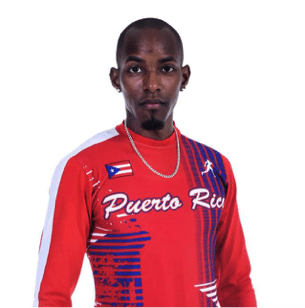

Luis Joel Castro became the first Puerto Rican to break a record in the high jump category this year.
Many Black athletes in Puerto Rico, like Luis Joel Castro, are recruited by the University of Puerto Rico, an institution which ironically refuses to hire more Black faculty members. If they care about recruiting Black athletes, then they should care about Black people in their own country. We shouldn’t worry about whether Javier Culson or Jaime Espinal won the gold medal at the Olympics and instead focus on who they are, how they got there and empower them to speak about racial relations in Puerto Rico more openly. However, part of that empowerment process is getting Black Puerto Ricans to stop drinking the Kool-Aid.
I am tired of seeing Puerto Ricans cheer for Black athletes pretending to not see race but then could care less for increasing resources for Black people in Puerto Rico and the diaspora. Puerto Ricans who need to stop calling Black people “negro acomplejao” and allow them to stand for racial justices starting with themselves. I am incredibly proud to see these Black Puerto Rican athletes achieve their dreams and give other Black youth hope in achieving their own dreams, but they need to use their limelight and help Black communities as Carmelo Anthony does. I wonder if these athletes took at least ten minutes to look around Rio de Janeiro and understand that the millions of dollars spent on the Olympics took the life of over two thousand Afro-Brazilians that were either killed or displaced in the process.
Therefore, I urge Black Puerto Rican athletes to become a symbol not just for Puerto Rico but also for Black communities. They win Olympic medals for an imagined nation that could care less about their own struggles. In addition, as Puerto Ricans, we need to come together and stop pretending we don’t see race. We simply can’t change our views on the Puerto Rican diaspora without discussing systemic racism. No country that has ever had enslaved Africans and racial hierarchies has been exempted of this enduring problem and Puerto Rico is not an exception.
***
William García is an Afro-Nuyorican raised between New York and Puerto Rico. He has a BA and an MA in history from the University of Puerto Rico-Rio Piedras and an MA from Teachers College at Columbia University. His research interests include Afro-Latino history, hip-hop and reggaetón in the Caribbean and Puerto Rican diaspora. You can follow him on Twitter @webdubois2014.



“Eres un negro acomplejado” es lo único que hace sentido y sólo en referencia al autor de este absurdo escrito.
This articles is all lies,, I’m Puerto Rican, my mom is black, my father is white, Spaniard blood line, In Puerto Rico we don’t have issues about racism, color skin, We don’t care about that. Latino Rebels site-web is all lies, making this statements to devide’s people thoughts. Puerto Rico people has a lots differences skin colors,u dummb ass.
No quiero exagerar, pero el autor de este artículo quiere crear división entre la población de Puerto Rico, ¿como si fuese pagados por grupos en Estados Unidos?, para crear lo que ocurre alla. Ese HP, que se calle la boca, aca todos somos boricuas, seamos jinchos, violetas o cafe con leche, todos nos queremos simplemente por ser boricuas.
Guys there is racism in PR… not to the level of US maybe but there is. I think most of it is actually socio economical in nature but the poorest areas tend to be darker of skin. Do you know many people who identify as black in PR? They are not black, they are trigueñitos or chocolate milk, never black. There is racism in PR search for the last census and see how many identify as white. This is the best example of the article. No one accepts it in the comments.
The best comment I heard after Jasmine Camacho’s gold medal win was, “Esa negra sabe a oro”. Try saying that to an American black, if you don’t have a black card!!! There is racism everywhere and that’s not to be denied but to trying to assert that it is a major problem in our country?? I don’t think so, particularly when there are families composed of both blond and blue eyed members as well as kinky haired blacks. I think that we, as a people have savored Jasmine’s gold as much or more than Monica’s. And let’s not talk about Tito, Culson, Wilfred Benítez, and of course our DominiRican friends who have represented us with dignity. Let’s not make a major issue where there isn’t one.
This article is a bunch of BS. You dont have a clue. No such thing in PR. You cannot compare the racism that exist in USA. Color ppl in PR dont have a chip on their shoulders about their race.
Puerto Ricans love and embrace their race Taino, Africano y Español.
The author probably can’t believe the amount of love Boricuas have shown to their athletes without looking at their skin color.
I think this is an exaggeration. Y’all don’t know what you’re talking about. Black Puertorican, white puertorican, yellow puertorican, we all Puertorican. Sure there’s always some racist idiot but not like this bullcrap article.
I won’t. That is exactly why I stopped visiting there. It is a cesspool.
OmegaPayton …thank you for not returning to Puerto Rico…we have enough trash here already.
JoseRosaCollazo…websites like this exist to fan the flames of faux-racism, fake-oppression and even phonier generic “La Tino” unity which has NOT existed in 500 years in the entire western hemisphere…but don’t tell them that…they get very upset and their Moroccan hijab scarves and French Berets get all out of whack.
I’m with you, Greg. This hate coming from the States is why island Boricuas do NOT break bread with them. They want to impose their own “hate whitey” narrative”. It’s some of the biggest self-hate I’ve ever seen. Most of them look like the people they hate upon. It looks silly AF. 100% Boricua. That’s enough. If these follish kids want to separate themselves, that is their business. No one is on this “one drop” nonsense. There are LOTS OF DROPS in the salsa, dear. Stop with your self-hating PREJUDICE.
Shitty articles like this make me wish PR would be independent. The idea of having to deal with these lost identity losers makes me reel.
IvanE I don’t identify as “white”. If you have a problem with the census, tell the President. Stop supporting “race” which is a big lie to begin with.
lreyescordova Infuidos por sus amiguitos afroamericanos……. los mas grandes racistas que hay.
OmegaPayton The only cesspool is in your racist wannabe-a-slave mind.
Does putting your light-skinned baby in the same picture as you make you feel more “WHITE”? Self-hate is MF. You won’t see it though. Too dense.
Caribe Latino…Omega is the typical hate whitey Uncle Tom negro…think OJ, think the NBA, think the NFL, think Tiger Woods…they HATE whites, but they can’t mount and breed enough 300 lb blonde Brit’Nees to make more screwed-up mulattos…and don’t remind them of the 80% rate of black throw-a-way children produced by black men each year…they get very upset when you tell them the UNDENIABLE truth…and don’t remind them EITHER that Obama HIMSELF is the poster child for a black “baby-daddy” who quickly abandoned the WHITE “baby-mama”…Omega is a cliche in America…a very, very sad one.
Who Are the a Th Keyes in the picture at the top I know 3 but I specifically want to know the one second from the right
This is sad but it is the same old story. The comments about this article prove that everything he is saying IS TRUE! Stop using the excuse that racism in PR is not like the states. There are no levels to anti-black racism ALL OF IT IS EVIL and harmful. Puerto Rico is not the exception and anyone who says it is usually benefits from white supremacy and the discrimination against black Puerto Ricans. Usually it is you lighter skinned closer to whiteness boricuas saying the BS that racism does no exist on the island and that is your perspective because your skin color provides you the privilege of not having to experience it. The truth of the matter is that Puerto Ricans praise whiteness and the closer you can get to it the better, that is the reason for the saying “Adelante La Raza”. The poem “Y tu abuela a dónde está?” was written by a black Puerto Rican in response to being insulted called black and big lipped by a white Puerto Rican. Mi gente let’s stop with the lies! The truth is that Spain did an amazingly thorough job of brainwashing the colonies with with white supremacy. Even so much as to the point where you could buy your whiteness if you had a white ancestor within four generations according to La Regla Del Sacar o Sacar de Gracias. So again stop with the lies. If you support anti blackness and white supremacy by denying the existence of racism in any colony that previously held African slaves you are racist, I don’t care who is in your family and what they look like! I know people from Loiza, Carolina, Arroyo, Naguabo just to name a few, see it completely differently and they would tell you that racism exists all over the island. The problem is that anti-black racism is so deeply embedded into our minds that it is the norm. It is time for Africa Puerto Ricans to wake up from this race on matrix and start to fight to be seen and to be heard, to be educated to be able to lead our communities and our island. I just hope today in 2022 Afro-Puerto Ricans are ready to make the stand. Last and suddenly not least before you jump what you’re saying all that shit learn Puerto Rican history.